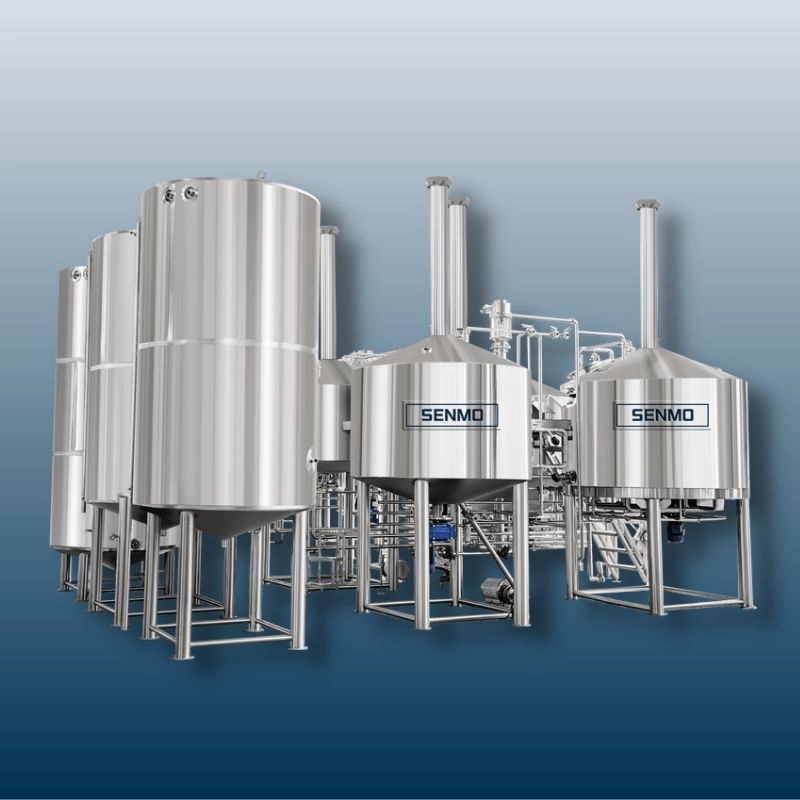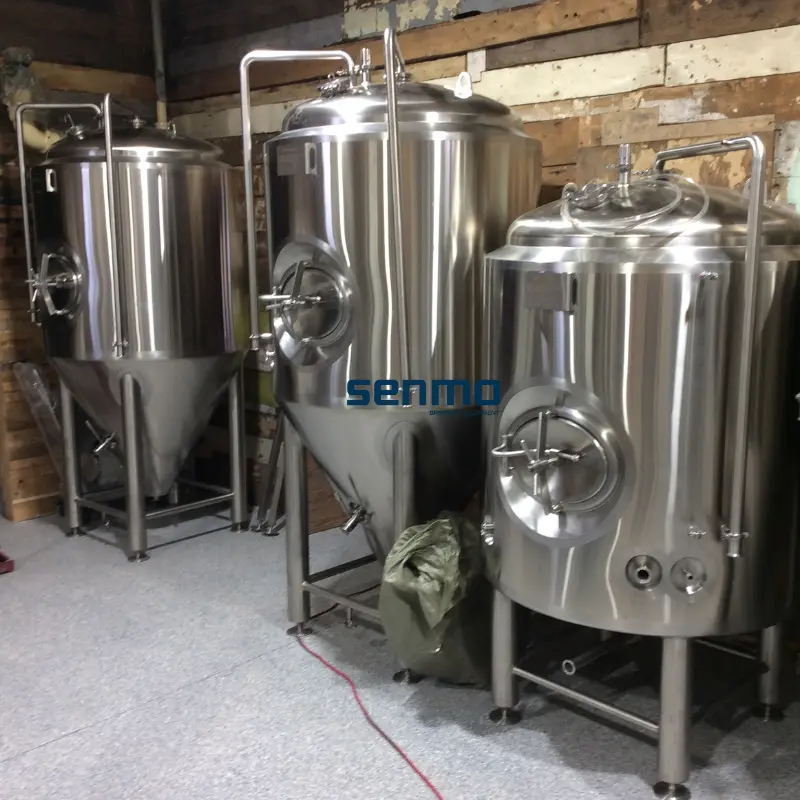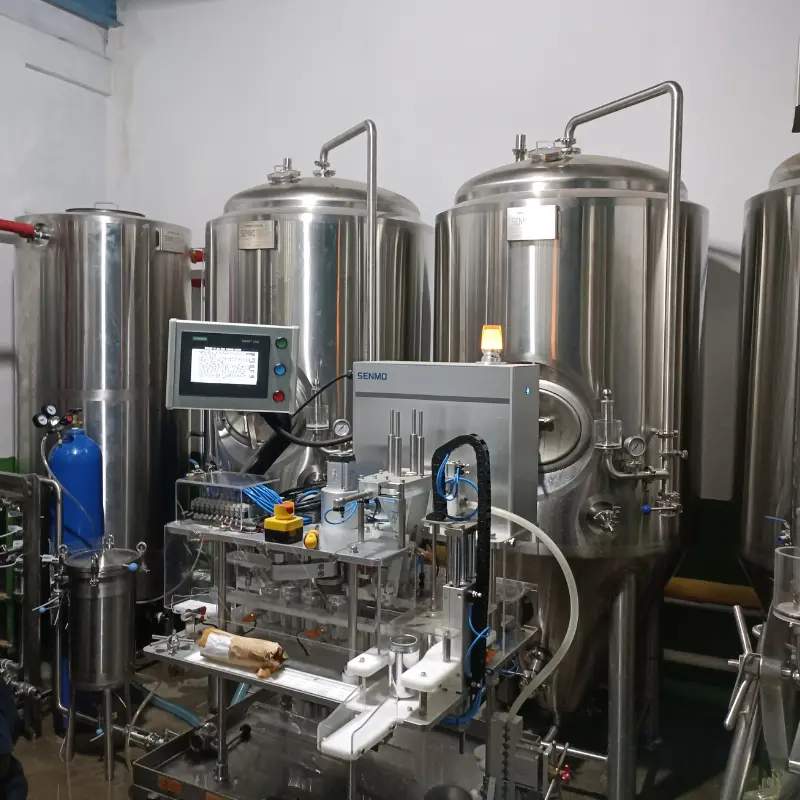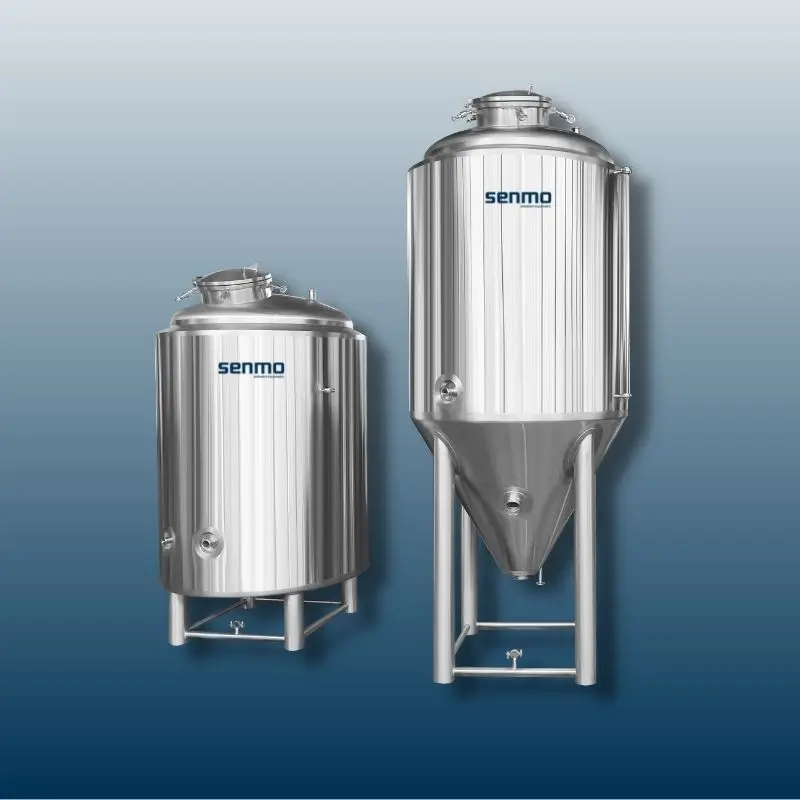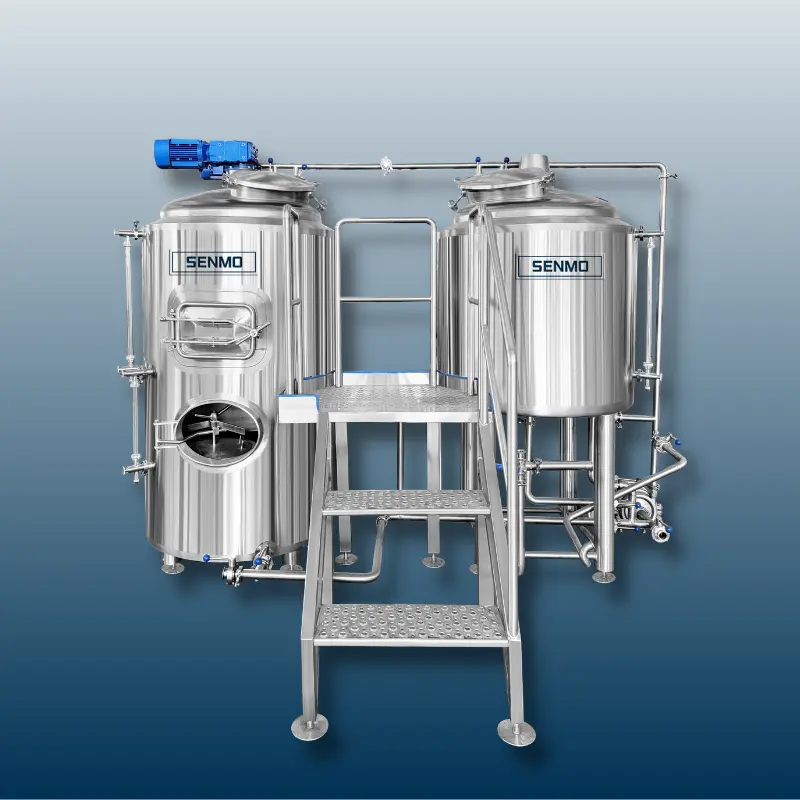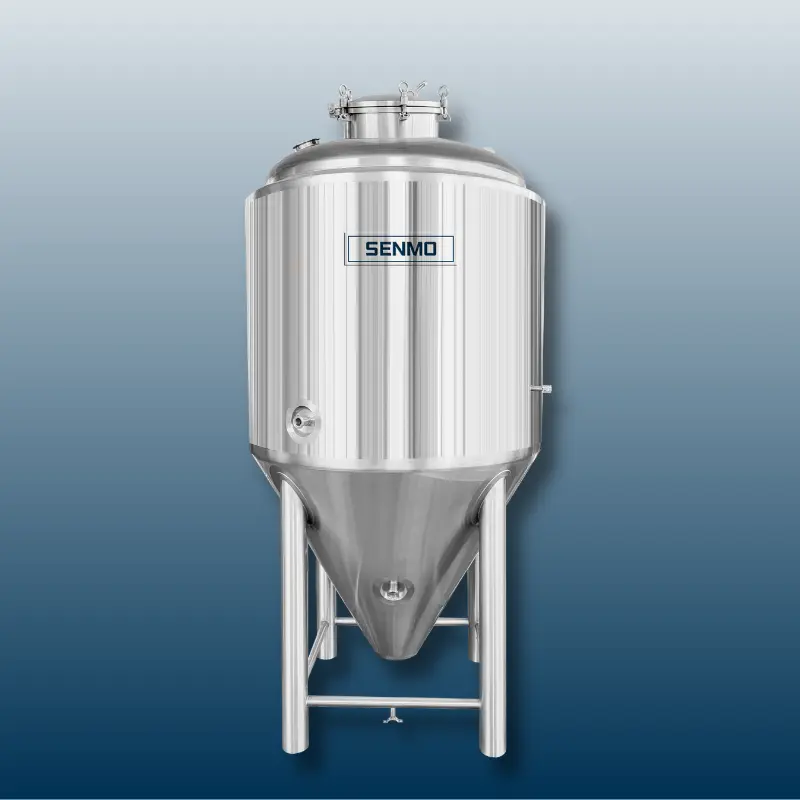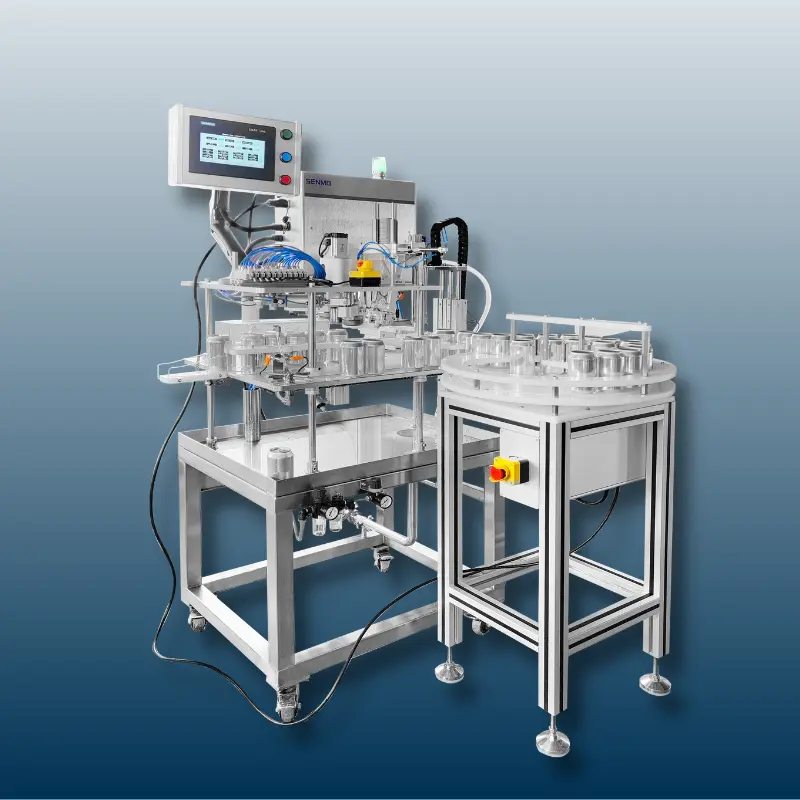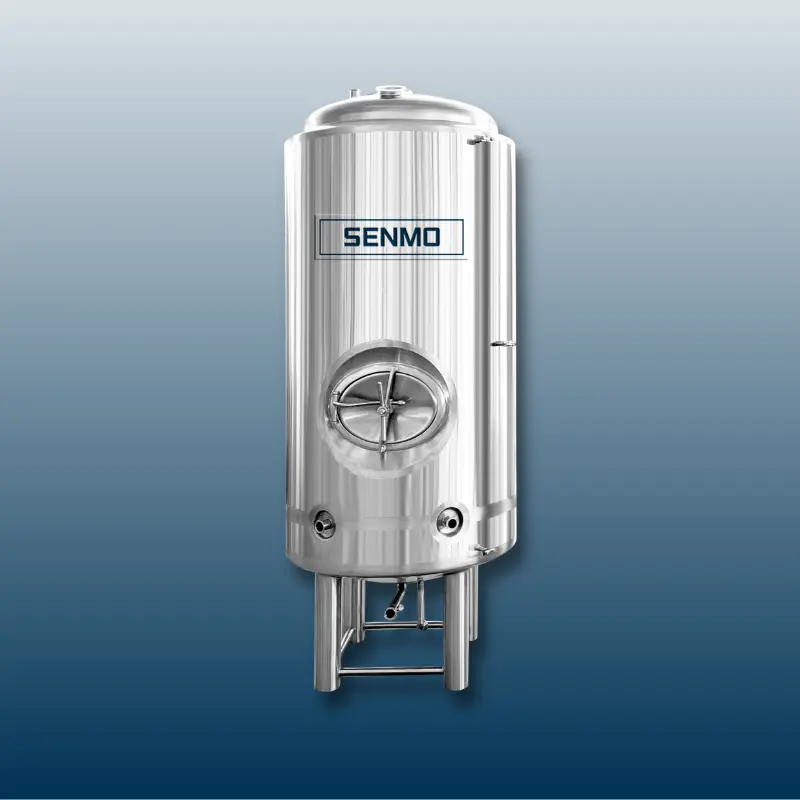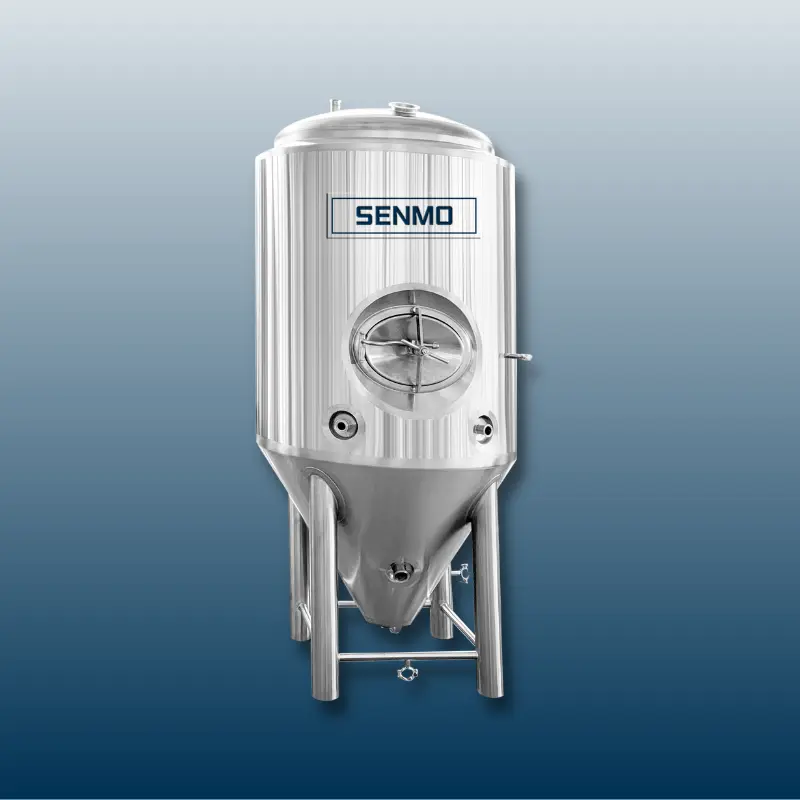Equipment Overview
Commercial beer brewing equipment encompasses a diverse array of machinery and tools tailored to streamline the brewing process. Among the key components are milling machines for malted grains, brew kettles for wort boiling, fermenters for yeast fermentation, conditioning tanks for beer maturation, and packaging machinery for bottling or canning.
Most Popular Specifications:Among the most popular specifications in commercial beer brewing equipment are 3 BBL, 5 BBL, and 7 BBL capacities.
Beer Brewing Equipment list
Here's a comprehensive list of commercial beer brewing equipment commonly used in breweries:
Brewhouse Equipment:
Mash Tun: Used for mashing grains and converting starches into fermentable sugars.
Lauter Tun: Used for separating the liquid wort from the solid grain husks.
Brew Kettle: Used for boiling the wort and adding hops.
Whirlpool: Used for separating hop solids and trub from the boiled wort.
Hot Liquor Tank (HLT): Stores and heats water for mashing and sparging.
Fermentation Equipment:
Fermentation Tanks: Vessels for fermenting wort into beer, available in various capacities and designs.
Brite Tanks: Used for secondary fermentation, carbonation, and conditioning of the beer before packaging.
Cooling and Temperature Control:
Glycol Chiller: Provides cooling for fermentation and conditioning processes through a glycol circulation system.
Plate Heat Exchanger: Used for rapidly cooling the boiled wort before transferring to fermentation tanks.
Fermentation Temperature Control System: Controls and maintains the temperature of fermentation tanks for optimal yeast activity and flavor development.
Cleaning and Sanitization Equipment:
Clean-in-Place (CIP) System: Automated system for cleaning and sanitizing brewing equipment and pipelines.
Keg Washer: Cleans and sanitizes kegs for reuse in packaging.
Packaging Equipment:
Kegging System: Fills kegs with beer under pressure for distribution and serving.
Bottling Line: Automatic or semi-automatic system for filling, capping, and labeling beer bottles.
Canning Line: Automatic system for filling, sealing, and labeling beer cans.
Accessories and Ancillary Equipment:
Grain Mill: Crushes malted barley or other grains for mashing.
Wort Grant: Temporary vessel used for collecting wort during lautering and transferring to the kettle.
Hop Back: Optional vessel for adding additional hop aroma and flavor to the wort before chilling.
Oxygenation Stone: Used for aerating wort before fermentation to promote yeast health and fermentation vigor.
Yeast Propagation System: Equipment for culturing and propagating yeast strains for fermentation.
This list covers the essential equipment required for commercial beer brewing, but you may also invest in additional specialty equipment depending on their specific brewing processes and production needs. It doesn't matter, because almost every commercial beer equipment is redesigned and has customized parts. Please contact our experts to give you the most cost-effective solution.
Our Production Range
We specialize in designing and manufacturing a comprehensive range of commercial beer brewing equipment, catering to various capacities from 1 BBL to 30 BBL. Each specification is meticulously crafted to meet the diverse needs of breweries, ensuring optimal performance and efficiency.
1 BBL, 1.5 BBL, and 2 BBL
Ideal for nano-breweries and small-scale operations, these compact brewing systems are perfect for experimental batches, taproom exclusives, and limited releases. They offer flexibility and precision in brewing, allowing brewers to fine-tune recipes and explore new flavors.
3 BBL, 4 BBL, and 5 BBL
These mid-sized brewing systems strike a balance between production capacity and space efficiency, making them suitable for microbreweries and brewpubs. They are versatile enough to accommodate a wide range of beer styles and production volumes while maintaining consistency and quality.
6 BBL, 7 BBL, and 10 BBL
Designed for small to medium-sized breweries, these systems offer increased brewing capacity and throughput, making them ideal for scaling up production and expanding distribution. They feature advanced controls and automation options to enhance brewing efficiency and workflow management.
15 BBL, 20 BBL, and 30 BBL
Tailored for larger breweries and production facilities, these high-capacity brewing systems are capable of handling large batch sizes and high-volume production demands. They incorporate robust construction, precision engineering, and state-of-the-art technology to ensure optimal performance and reliability.
Application Scenarios
Nano-breweries: 1 BBL to 2 BBL systems cater to nano-breweries seeking to experiment with small-batch brewing and test new recipes.
Microbreweries: 3 BBL to 10 BBL systems are well-suited for microbreweries aiming to produce a diverse range of beer styles for local distribution and taproom sales.
Brewpubs: 6 BBL to 20 BBL systems are ideal for brewpubs looking to offer a rotating selection of craft beers on-site and to-go.
Production Breweries: 15 BBL to 30 BBL systems are designed for production breweries focused on large-scale brewing and distribution to regional or national markets.
By offering a comprehensive range of brewing equipment across various capacities, we aim to support brewers of all scales and aspirations in achieving their brewing goals with precision, efficiency, and excellence.
Operation and Maintenance
Brewers must understand how to operate and maintain commercial beer brewing equipment to ensure consistent performance and longevity. This includes following manufacturer guidelines for equipment setup, cleaning, sanitization, and routine maintenance tasks. Regular equipment inspections and preventive maintenance are essential to minimize downtime and prevent costly repairs.
Effective operation and maintenance practices are essential for maximizing the performance and longevity of commercial beer brewing equipment. Brewers must adhere to manufacturer guidelines and best practices to ensure consistent operation and minimize downtime. Here's a comprehensive guide to operating and maintaining brewing equipment:
1. Equipment Setup
Before operation, ensure that all brewing equipment is properly installed and calibrated according to manufacturer specifications.
Verify that electrical connections, plumbing, and ventilation systems are in place and functioning correctly.
Conduct initial testing and commissioning to ensure proper functionality of all equipment components.
2. Cleaning and Sanitization
Develop and implement a regular cleaning and sanitization schedule for all brewing equipment, including tanks, pipelines, and valves.
Use approved cleaning agents and sanitizers suitable for brewery equipment to eliminate microbial contamination and prevent off-flavors.
Follow established cleaning procedures, including disassembly of equipment, manual scrubbing, circulation of cleaning solutions, and thorough rinsing.
3. Routine Maintenance
Perform routine maintenance tasks as recommended by the equipment manufacturer, including lubrication, inspection of seals and gaskets, and calibration of sensors and gauges.
Keep detailed records of maintenance activities, including dates, tasks performed, and any issues encountered.
Address minor issues promptly to prevent them from escalating into major problems that could disrupt brewing operations.
4. Equipment Inspections
Conduct regular inspections of brewing equipment to identify signs of wear, corrosion, or damage.
Inspect seals, fittings, and connections for leaks and tighten or replace components as needed.
Check control panels, sensors, and instrumentation for proper functioning and accuracy.
5. Preventive Maintenance
Implement a preventive maintenance program to proactively address potential equipment failures and extend the lifespan of brewing equipment.
Schedule periodic inspections, lubrication, and replacement of wear parts according to manufacturer recommendations.
Consider investing in predictive maintenance technologies, such as vibration analysis or thermography, to identify early signs of equipment degradation.
6. Training and Documentation
Provide comprehensive training to brewery staff on the proper operation and maintenance of brewing equipment.
Develop standard operating procedures (SOPs) and maintenance protocols for each piece of equipment and ensure that all staff members are familiar with and adhere to these procedures.
Maintain detailed documentation of equipment manuals, maintenance records, and service contracts for reference and compliance purposes.
By following these operation and maintenance guidelines, brewers can ensure the consistent performance, reliability, and longevity of commercial beer brewing equipment, ultimately contributing to the production of high-quality beer and the success of the brewery.
Upgrades and Innovations
In an ever-evolving industry, breweries must continuously explore technological advancements and innovations in brewing equipment to maintain competitiveness and drive operational excellence. Upgrading equipment with new features, automation systems, and sustainability initiatives can significantly enhance production efficiency, product quality, and overall brewery performance. Here's how breweries can leverage upgrades and innovations to stay ahead in the market:
1. Incorporating New Features
Regularly evaluate equipment manufacturers' offerings to identify new features and capabilities that can improve brewing processes.
Consider upgrades such as advanced temperature control systems, precise flow meters, integrated cleaning-in-place (CIP) systems, and remote monitoring capabilities.
Invest in equipment with modular designs that allow for future expansions and customization to accommodate changing production needs.
2. Automation and Control Systems
Embrace automation technologies to streamline brewing operations, reduce manual labor, and enhance process consistency.
Implement automated mash temperature control, wort transfer systems, and fermentation monitoring systems to optimize efficiency and quality.
Utilize programmable logic controllers (PLCs) and supervisory control and data acquisition (SCADA) systems for centralized control and real-time data analysis.
3. Sustainability Initiatives
Integrate sustainable practices into brewing equipment design and operation to minimize environmental impact and reduce resource consumption.
Invest in energy-efficient brewing systems, heat recovery systems, and water recycling technologies to conserve resources and lower operational costs.
Explore alternative packaging solutions, such as recyclable cans, biodegradable packaging materials, and eco-friendly labeling options.
4. Process Optimization and Efficiency
Collaborate with equipment manufacturers and industry experts to identify process optimization opportunities and implement efficiency-enhancing solutions.
Conduct energy audits, process simulations, and performance evaluations to identify bottlenecks and inefficiencies in brewing operations.
Implement lean manufacturing principles and continuous improvement initiatives to streamline workflows and eliminate waste.
5. Collaboration and Knowledge Sharing
Foster collaboration with equipment manufacturers, suppliers, and industry peers to exchange ideas, share best practices, and explore emerging technologies.
Participate in industry conferences, trade shows, and workshops to stay informed about the latest trends, innovations, and regulatory developments.
Engage with research institutions, academic partners, and technology incubators to leverage cutting-edge research and development in brewing equipment design and optimization.
By embracing upgrades and innovations in brewing equipment, breweries can enhance their competitiveness, drive operational efficiency, and position themselves as leaders in the dynamic and rapidly evolving craft beer market. Collaboration with industry partners and a commitment to continuous improvement are essential for staying at the forefront of brewing technology and innovation.
Case Studies and Success Stories
Examining case studies and success stories from established breweries offers valuable insights into equipment selection, configuration, and management. By learning from industry leaders' experiences and best practices, breweries can overcome challenges, streamline operations, and achieve their brewing goals. Here are a few notable case studies showcasing successful implementations of brewing equipment:
Case 1: 300L Brewhouse for Micro Distillery in Grenada
A complete 300L mash tun system was installed for a micro distillery in Grenada.
The equipment features steam heating with semi-automatic control, ensuring precise temperature regulation during the brewing process.
Located in Grenada, this micro distillery serves as a local hub for craft spirits production, offering visitors the opportunity to witness the equipment in operation firsthand.
Case 2: 300L Microbrewery Beer Equipment for a Philippine Client
Designed specifically for a client in the Philippines, this 300L microbrewery beer equipment exemplifies meticulous design and engineering.
The brewing equipment is tailored to maximize the utilization of brewing materials and minimize energy consumption, reflecting a commitment to sustainability and efficiency.
With a focus on quality and craftsmanship, this microbrewery beer equipment enables the client to produce premium beers that meet consumer demand in the Philippine market.
Case 3: 1000L 4-Vessel Beer Brewing Equipment in Vietnam
SENMO brand offers a comprehensive 1000L 4-vessel beer brewing equipment solution for breweries in Vietnam.
Designed for large-scale beer production, this equipment consists of four vessels, each serving a specific function in the brewing process.
By leveraging advanced technology and superior craftsmanship, breweries in Vietnam can produce high-quality beer efficiently and cost-effectively, catering to the growing demand for craft beer in the region.
These case studies highlight the diverse applications and benefits of brewing equipment across different markets and scales of operation. By studying successful implementations and learning from industry peers, breweries can make informed decisions when selecting, configuring, and managing brewing equipment, ultimately driving their success in the competitive craft beer industry.
Future Trends and Outlook
As the commercial beer brewing industry continues to evolve, breweries must anticipate future trends and embrace innovations to remain competitive and meet evolving consumer demands. Here's a look at some of the key trends shaping the future of brewing equipment:
1. Smart Brewing Systems
The integration of smart technologies, such as Internet of Things (IoT) sensors and data analytics, will revolutionize brewing operations.
Smart brewing systems will enable real-time monitoring of key parameters, predictive maintenance, and automated process control, enhancing efficiency and quality.
2. Energy-Efficient Equipment
With a growing emphasis on sustainability, breweries will increasingly adopt energy-efficient brewing equipment and practices.
Advances in heat recovery systems, solar energy integration, and energy management software will help breweries minimize environmental impact and reduce operating costs.
3. Eco-Friendly Packaging Solutions
Breweries will prioritize eco-friendly packaging solutions, such as recyclable cans, biodegradable packaging materials, and reusable containers.
Sustainable packaging initiatives will resonate with environmentally conscious consumers and support breweries' efforts to reduce waste and carbon footprint.
4. Modular and Flexible Designs
Brewing equipment with modular and flexible designs will gain popularity, allowing breweries to easily scale production capacity and adapt to changing market demands.
Modular systems will enable breweries to customize equipment configurations, upgrade components, and optimize space utilization for maximum flexibility.
5. Automation and Robotics
Automation and robotics will play an increasingly significant role in brewing operations, automating repetitive tasks and improving production efficiency.
Robotic systems for ingredient handling, bottling, labeling, and palletizing will streamline workflows and reduce labor costs while ensuring consistency and quality.
6. Digitalization of Brewing Processes
Digitalization of brewing processes, including recipe management, inventory tracking, and quality control, will become commonplace.
Cloud-based brewing software platforms will provide breweries with centralized data management, collaboration tools, and predictive analytics capabilities for better decision-making.
7. Customization and Personalization
Breweries will focus on offering customized and personalized beer experiences to meet diverse consumer preferences and tastes.
Brewing equipment with advanced recipe management capabilities and small-batch production capabilities will enable breweries to experiment with unique flavors and styles.
In summary, the future of commercial beer brewing equipment is characterized by innovation, sustainability, and adaptability. Breweries that embrace smart technologies, energy-efficient practices, eco-friendly packaging solutions, and modular designs will be well-positioned to thrive in a rapidly evolving market landscape. By staying ahead of emerging trends and anticipating consumer preferences, breweries can continue to push the boundaries of brewing excellence and deliver exceptional beer experiences to consumers worldwide.
Conclusion
Commercial beer brewing equipment forms the foundation of every successful brewery operation, enabling brewers to produce high-quality beer efficiently and consistently. By understanding the equipment selection criteria, optimizing layout and configuration, mastering operation and maintenance practices, embracing innovation, and anticipating future trends, breweries can position themselves for long-term success in the dynamic and competitive brewing industry.
Senmo Machinery is a professional manufacturer specializing in the design and production of commercial beer brewing equipment. With years of experience in the brewing industry, we offer a wide range of high-quality brewing equipment, including brewhouses, fermenters, bright tanks, and packaging machinery. Our products are customized to meet the specific needs of breweries of all sizes, and we are committed to providing innovative solutions, superior quality, and excellent customer service. With a global presence and a focus on sustainability, Senmo Machinery is your trusted partner for success in the brewing industry.
Our Company's Advantages
At Senmo Machinery, we pride ourselves on several key advantages that set us apart in the commercial beer brewing equipment industry:
Extensive Experience: With years of experience in the brewing industry, we have developed a deep understanding of the unique requirements and challenges faced by breweries of all sizes. Our expertise allows us to provide tailored solutions to meet the diverse needs of our clients.
Comprehensive Product Range: We offer a wide range of high-quality brewing equipment, including brewhouses, fermenters, bright tanks, and packaging machinery. Whether you're a small craft brewery or a large-scale production facility, we have the equipment to support your brewing operations.
Customization Capability: Our products are fully customizable to meet the specific requirements of each brewery. From equipment capacity and configuration to material selection and design aesthetics, we work closely with our clients to deliver bespoke solutions that fit their unique brewing processes and space constraints.
Quality Manufacturing: Located in Jinan city, the hometown of China's beer equipment, our state-of-the-art factory boasts over 2000m2 of workshop space and a team of more than 80 skilled production employees. We adhere to strict quality control measures throughout the manufacturing process to ensure that every piece of equipment meets our high standards of craftsmanship and durability.
Global Presence: While based in China, we serve clients worldwide and have established a strong global presence. Our sales and after-sales service teams, comprising over 20 dedicated professionals, are committed to providing prompt and attentive support to our customers wherever they are located.
Focus on Sustainability: As part of our commitment to sustainability, we prioritize the use of environmentally friendly materials and manufacturing processes in our operations. We strive to minimize our environmental footprint while delivering innovative and efficient brewing solutions to our clients.
Customer-Centric Approach: Above all, we are dedicated to providing excellent customer service. We prioritize open communication, responsiveness, and transparency in our interactions with clients, ensuring that their needs are met and expectations exceeded at every step of the process.
With Senmo Machinery as your partner, you can trust that you're working with a reliable and innovative manufacturer committed to your success in the brewing industry.
Contact Us
Shandong SENMO Machinery Co., Ltd.
No.1666 of Xinluo street,High tech zone,Jinan,Shandong
